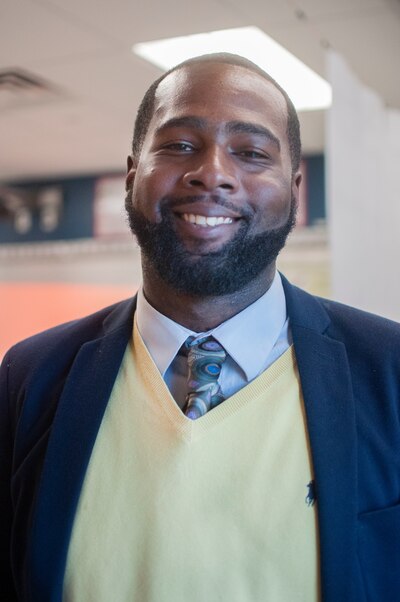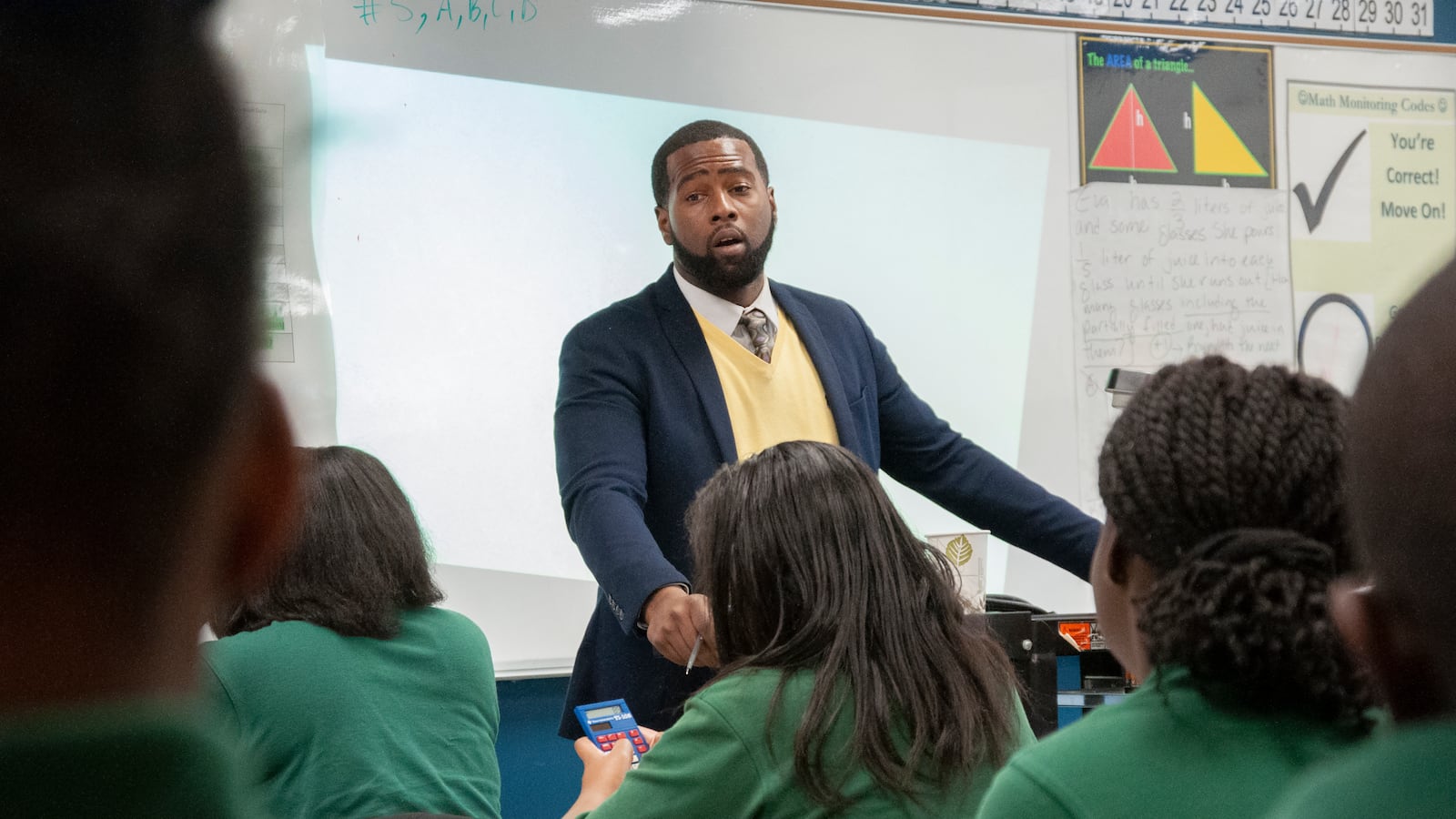Here, in a feature we call How I Teach, we talk to educators about how they approach their jobs. You can see other pieces in the series here.
Raymond Blanks knows Newark gets a bad rap beyond its borders. He also knows “how beautiful” his hometown can be. After college, the University High School graduate said returning to teach the children of Newark felt like a personal responsibility.
Back in high school, Blanks was inspired by his then principal, Roger León, who has since become the district superintendent. “He used to tell us that he worked for us, and whatever we needed, it was his job to give to us,” Blanks said of León.
Now, with seven years in the classroom under his belt, Blanks is as determined as ever to serve his community and “pay it forward.” According to him, he is currently one of two black male teachers at North Star Academy’s West Side Park Middle School, a charter school where he teaches sixth-grade math.
Black men like Blanks remain underrepresented in America’s teaching force, making up only 2% of teachers nationwide. Research shows that when students have teachers who look like them, their academic performance improves. But even in Newark, where around half of the students are black, black men make up only about 8% of the teaching force.
Blanks talked to Chalkbeat about what it’s like being one of the few black male educators in the city, getting to know his middle schoolers through music and video games, being awed by his students’ “grit” amid adversity, and showing them how math is relevant to their lives.
This interview has been condensed and lightly edited for length and clarity.
Was there a moment when you decided to become a teacher?
If there was a conscious decision, it was because of the stigma I hear about my own city and what I would hear about our failing schools. That was something that motivated me to be someone who could maybe change the narrative — only 2% of teachers across the country are black men. It was that, and seeing the correlation between illiteracy and education and crime. So there wasn’t just a moment. It was a really strategic decision, and a lot of things played a factor.
Tell me more about the stigma you heard about living in Newark and what in particular struck a chord with you.
There’s a misconception that the whole city is dangerous when that’s not really the case. Even in college I had experiences where I’m articulating myself to a dean and they’re surprised that I’m from the city of Newark because they think that everyone from here is a certain way. I know how beautiful Newark can be.
How do you get to know your students?
I like to get to know my students by eating lunch with them. Sometimes I’ll just ask them who their favorite artists are and what video games they like to play. They take a liking to me being interested in things that they like to do that’s not math or academics. They may talk about a rapper that I have no idea about, and it lets me know that I’m getting older, so that’s funny. And I’ll say who I listen to and they’ll say I’m old, so we can make jokes about it.
Tell us about a favorite lesson to teach. Where did the idea come from?
I used to teach high school, so it’s a high school lesson about stop-and-frisk in Newark, [when] police stop people for random searches or checks. The lesson was about ratios and proportions, so I was still bringing math into the classroom. What I had them look at was the rate at which men of color are stopped and the rate at which white men are stopped.Then we looked to see if the numbers were proportional, or if black and brown men were stopped at the same rate as white men. We found that it was disproportional. So that lesson empowers the students through mathematics. When they can see how math ties into something relevant, it’s a little more powerful.

What’s something happening in the community that affects what goes on inside your class?
The kids are a little mindful of the lead situation. They’ll tell me,“Hey, Mr. Blanks, the water fountain is on red. That means the filter needs to be changed.” … In this West Side Park community, you see a lot more single parent homes, and we get a lot of mixed emotions every day. And as an educator, you’re trying to figure out how to reach this kid so that they feel safe and comfortable enough, so I can deliver this lesson. Sometimes in the classroom, you find yourself being a guidance counselor, and you have to figure out a way to persevere. I try to ask, “Hey, is everything okay?” before I jump to conclusions and ask why they aren’t working. It could be something from home that spilled over into the classroom.
Tell us about a memorable time — good or bad — when contact with a student’s family changed your perspective or approach.
There was a situation where a student was struggling with hygiene. It wasn’t a situation that got to the point of bullying, but the student was self-conscious about it. We were able to get ahold of a parent, and we realized how some of our students experienced neglect from their guardians and are basically raising themselves. And it’s like, “Wow, they have a lot more grit and perseverance than I had at that age.” My perspective has definitely changed. I definitely try to be more patient. Being from this community, I know it involves a certain grit that you have to have, but these are things that I wasn’t exposed to. So I really have an appreciation — or a certain level of love and affection — for children who have to go through that and are still able to do what they need to do at school.
Is there anyone in your life who swayed your decision to become a teacher?
My old high school principal is Newark’s current superintendent Roger León. He had high expectations for us. He’s someone that really inspired me when I was a student. He used to tell us that he worked for us, and whatever we needed, it was his job to give to us. So that stuck with me even a decade ago when he was my principal.
My former math teacher, Sean Lloyd, was someone I always looked up to. He was so hard on us, but it was always coming from a place of love. He had high expectations, and he knew what we were capable of. So at a very young age, he just really instilled in us how great we were, but we had to put the work in. And he’s someone that I eventually, years later, ended up working with, which was really cool. We keep in touch to this day. He’s gone from my teacher to my friend over the years.
How did it impact you having him, another black man, as your teacher?
For me as a student, it definitely made a difference. I was lucky enough to have, growing up, four or five black male teachers, but I meet kids from my own community who have had zero. Seeing someone who teaches well and cares about students that look like me I think really played a factor in my becoming a teacher. I thought, “What’s one of the biggest ways I can have an impact in my community and pay it forward?”
What’s the best advice you’ve received about teaching?
Be patient with children and invest in them, but still hold them to the expectations that you think they should be meeting.
What part of your job is the most difficult?
It’s just a lot of time and energy that you’re investing, which I underestimated. Like, I’m investing energy in a hundred lives every year. And I get a new group of kids each year, so that takes a lot out of you.
My first year of teaching, I actually was at a crossroads where I didn’t know what to do because I was struggling so much and I didn’t think I was cut out for it. I had a moment where I was like, “Do I change careers?” I didn’t have command of the classroom and that humbled me. I decided that I had to be better, especially when you’re dealing with students who have mixed emotions and are sometimes raising themselves. They’re angry, maybe not at you, but at their living conditions, and they don’t know how to channel their emotions. I think I underestimated how hard this work is right when I first started teaching.
What made you want to stick with teaching?
I like challenges, so I wanted to take on the challenge. Also, intangibles kind of seeped in. For example, I’m from Newark, and black men are good for the classroom. I wanted to be an example for young men and someone that our young women can go to to talk, and just being someone who children can say they remember having and they enjoyed learning with. It’s all coming from a place of love.
Can you tell me about a time when being a black male teacher made a difference in your classroom?
A lot of has been indirect, but I had a parent who I had to call because, unfortunately, her daughter was being rude and not being herself — she’s one of my top students, and I rarely have to call home. The mother said to me, “She’s acting that way because she doesn’t have her father and she sees you as a father figure in her life.” And that was something that resonated with me because, this student has never told me this, but she has at least told her mom. I do know that this kind of work creates situations where I may be filling a void for some students, which is another reason why I do this work. That’s why it’s so important and why especially more black men should do it.


